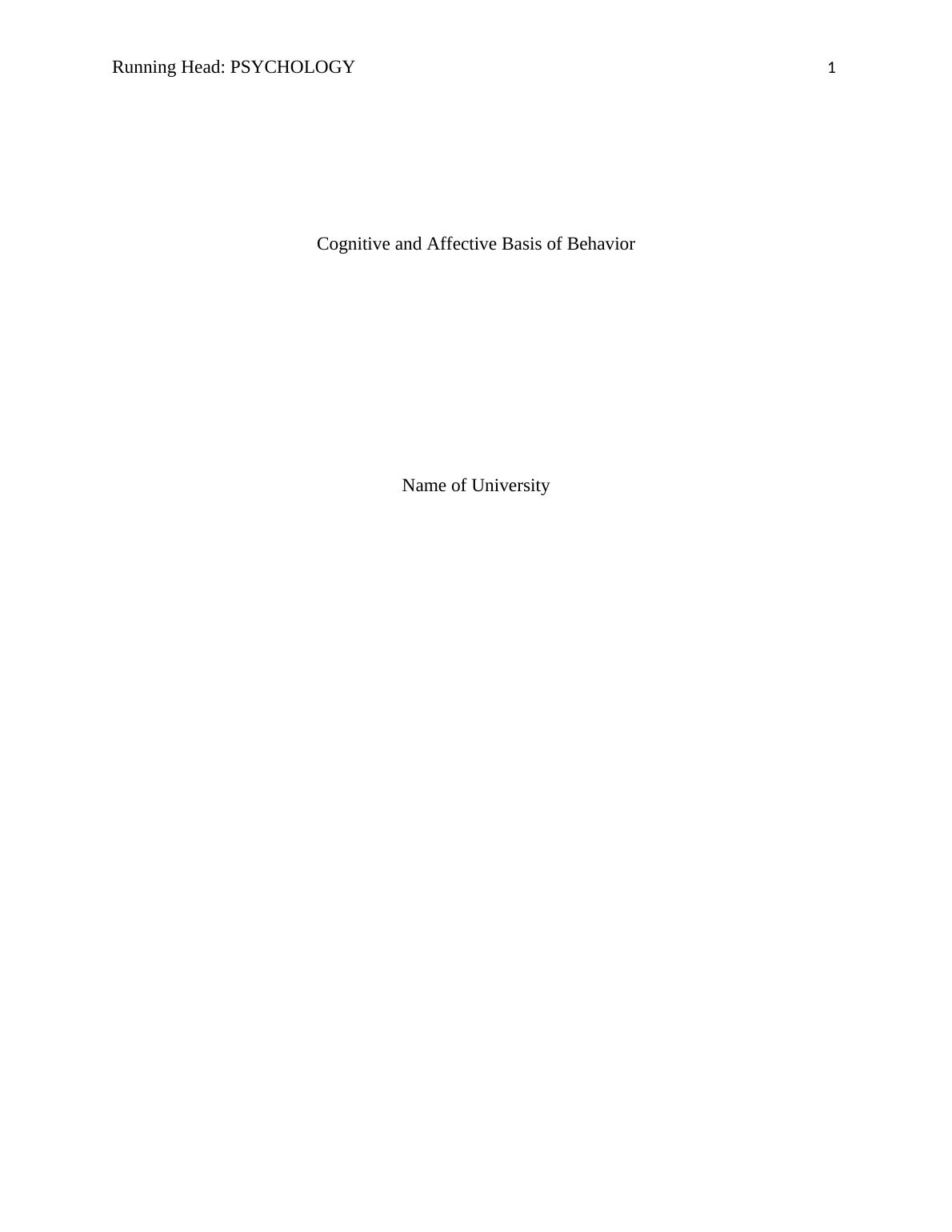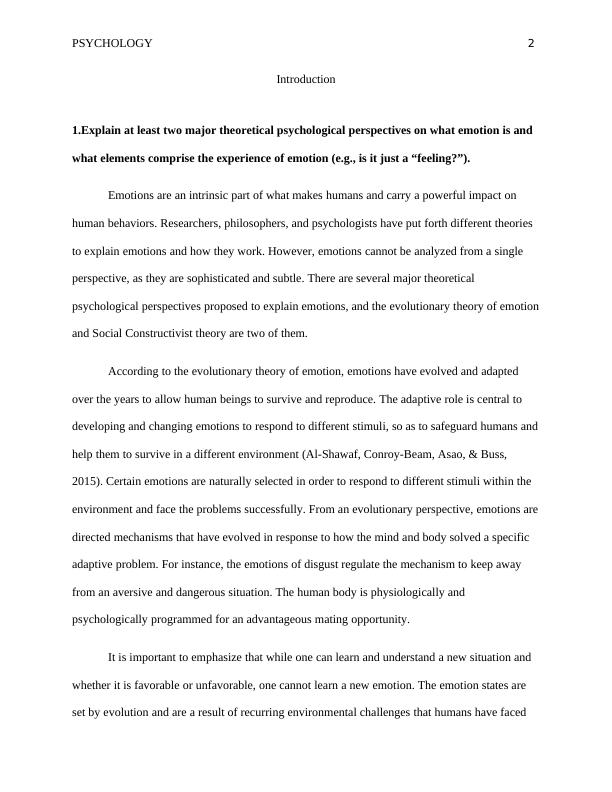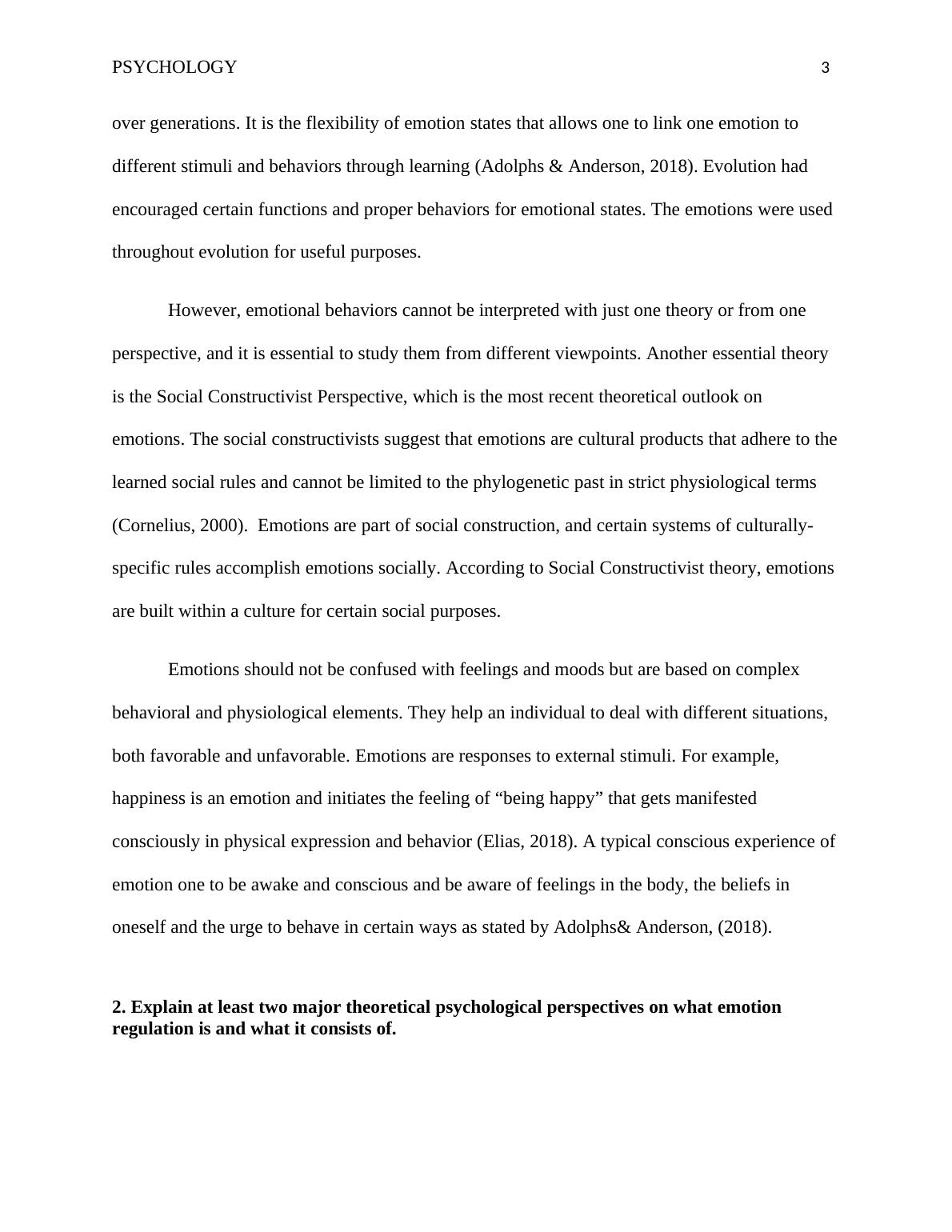What Emotion Is and What Does It Entail?
Added on 2022-07-28
10 Pages2370 Words74 Views
Running Head: PSYCHOLOGY 1
Cognitive and Affective Basis of Behavior
Name of University
Cognitive and Affective Basis of Behavior
Name of University

PSYCHOLOGY 2
Introduction
1.Explain at least two major theoretical psychological perspectives on what emotion is and
what elements comprise the experience of emotion (e.g., is it just a “feeling?”).
Emotions are an intrinsic part of what makes humans and carry a powerful impact on
human behaviors. Researchers, philosophers, and psychologists have put forth different theories
to explain emotions and how they work. However, emotions cannot be analyzed from a single
perspective, as they are sophisticated and subtle. There are several major theoretical
psychological perspectives proposed to explain emotions, and the evolutionary theory of emotion
and Social Constructivist theory are two of them.
According to the evolutionary theory of emotion, emotions have evolved and adapted
over the years to allow human beings to survive and reproduce. The adaptive role is central to
developing and changing emotions to respond to different stimuli, so as to safeguard humans and
help them to survive in a different environment (Al-Shawaf, Conroy-Beam, Asao, & Buss,
2015). Certain emotions are naturally selected in order to respond to different stimuli within the
environment and face the problems successfully. From an evolutionary perspective, emotions are
directed mechanisms that have evolved in response to how the mind and body solved a specific
adaptive problem. For instance, the emotions of disgust regulate the mechanism to keep away
from an aversive and dangerous situation. The human body is physiologically and
psychologically programmed for an advantageous mating opportunity.
It is important to emphasize that while one can learn and understand a new situation and
whether it is favorable or unfavorable, one cannot learn a new emotion. The emotion states are
set by evolution and are a result of recurring environmental challenges that humans have faced
Introduction
1.Explain at least two major theoretical psychological perspectives on what emotion is and
what elements comprise the experience of emotion (e.g., is it just a “feeling?”).
Emotions are an intrinsic part of what makes humans and carry a powerful impact on
human behaviors. Researchers, philosophers, and psychologists have put forth different theories
to explain emotions and how they work. However, emotions cannot be analyzed from a single
perspective, as they are sophisticated and subtle. There are several major theoretical
psychological perspectives proposed to explain emotions, and the evolutionary theory of emotion
and Social Constructivist theory are two of them.
According to the evolutionary theory of emotion, emotions have evolved and adapted
over the years to allow human beings to survive and reproduce. The adaptive role is central to
developing and changing emotions to respond to different stimuli, so as to safeguard humans and
help them to survive in a different environment (Al-Shawaf, Conroy-Beam, Asao, & Buss,
2015). Certain emotions are naturally selected in order to respond to different stimuli within the
environment and face the problems successfully. From an evolutionary perspective, emotions are
directed mechanisms that have evolved in response to how the mind and body solved a specific
adaptive problem. For instance, the emotions of disgust regulate the mechanism to keep away
from an aversive and dangerous situation. The human body is physiologically and
psychologically programmed for an advantageous mating opportunity.
It is important to emphasize that while one can learn and understand a new situation and
whether it is favorable or unfavorable, one cannot learn a new emotion. The emotion states are
set by evolution and are a result of recurring environmental challenges that humans have faced

PSYCHOLOGY 3
over generations. It is the flexibility of emotion states that allows one to link one emotion to
different stimuli and behaviors through learning (Adolphs & Anderson, 2018). Evolution had
encouraged certain functions and proper behaviors for emotional states. The emotions were used
throughout evolution for useful purposes.
However, emotional behaviors cannot be interpreted with just one theory or from one
perspective, and it is essential to study them from different viewpoints. Another essential theory
is the Social Constructivist Perspective, which is the most recent theoretical outlook on
emotions. The social constructivists suggest that emotions are cultural products that adhere to the
learned social rules and cannot be limited to the phylogenetic past in strict physiological terms
(Cornelius, 2000). Emotions are part of social construction, and certain systems of culturally-
specific rules accomplish emotions socially. According to Social Constructivist theory, emotions
are built within a culture for certain social purposes.
Emotions should not be confused with feelings and moods but are based on complex
behavioral and physiological elements. They help an individual to deal with different situations,
both favorable and unfavorable. Emotions are responses to external stimuli. For example,
happiness is an emotion and initiates the feeling of “being happy” that gets manifested
consciously in physical expression and behavior (Elias, 2018). A typical conscious experience of
emotion one to be awake and conscious and be aware of feelings in the body, the beliefs in
oneself and the urge to behave in certain ways as stated by Adolphs& Anderson, (2018).
2. Explain at least two major theoretical psychological perspectives on what emotion
regulation is and what it consists of.
over generations. It is the flexibility of emotion states that allows one to link one emotion to
different stimuli and behaviors through learning (Adolphs & Anderson, 2018). Evolution had
encouraged certain functions and proper behaviors for emotional states. The emotions were used
throughout evolution for useful purposes.
However, emotional behaviors cannot be interpreted with just one theory or from one
perspective, and it is essential to study them from different viewpoints. Another essential theory
is the Social Constructivist Perspective, which is the most recent theoretical outlook on
emotions. The social constructivists suggest that emotions are cultural products that adhere to the
learned social rules and cannot be limited to the phylogenetic past in strict physiological terms
(Cornelius, 2000). Emotions are part of social construction, and certain systems of culturally-
specific rules accomplish emotions socially. According to Social Constructivist theory, emotions
are built within a culture for certain social purposes.
Emotions should not be confused with feelings and moods but are based on complex
behavioral and physiological elements. They help an individual to deal with different situations,
both favorable and unfavorable. Emotions are responses to external stimuli. For example,
happiness is an emotion and initiates the feeling of “being happy” that gets manifested
consciously in physical expression and behavior (Elias, 2018). A typical conscious experience of
emotion one to be awake and conscious and be aware of feelings in the body, the beliefs in
oneself and the urge to behave in certain ways as stated by Adolphs& Anderson, (2018).
2. Explain at least two major theoretical psychological perspectives on what emotion
regulation is and what it consists of.

End of preview
Want to access all the pages? Upload your documents or become a member.
Related Documents
Psychology: Evolution, Behavior and Respondent Conditioninglg...
|8
|1362
|494
Assignment on Evolutionary Psychology of Human Behaviourlg...
|11
|3134
|46
Introduction to Psychology Assignmentlg...
|10
|2237
|65
Factors promoting attachment, Evolutionary vs. Cupboard Love theory, Deprivation vs. Privationlg...
|10
|2955
|133
Altruismlg...
|7
|1983
|192
Self-Sacrifice: An Exploration of Altruism in Human Naturelg...
|7
|1931
|311
